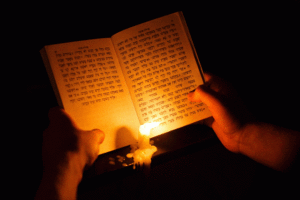Earlier this week, the sun set on the 9th of Av (called Tish’a b’Av in Hebrew) in the Jewish calendar. It is the traditional day of mourning for terrible things that have happened in our past – the destruction of both the First and the Second Temples, the Expulsion from England, the Expulsion from Spain, various pogroms, and the beginning of World War I, which eventually led to World War II and the Holocaust.
Traditionally, Jews fast on this day and chant the book of Eicha (Lamentations). Mourning customs are observed, and for many it is a day of reflection on how we treat each other. The Sages of the Talmud, who experienced the destruction of the Second Temple by the Romans in the first century CE, said that the fall of Jerusalem was caused by sinat chinam – baseless hatred. The different factions in the last independent Jewish state before the 20th century hated each other so much that they would rather see the Romans destroy everything than have their rivals triumph. One cannot help but think of people who are risking their own health and that of their communities to “own the libs”, but that’s a different conversation.
I don’t know about you, but the term “baseless hatred” bothers me, because it suggests that hatred that is based in grudges and history is OK. And yet the Torah adjures us “You shall not hate your brother in your heart. You shall rebuke your fellow, and not bear sin because of him” (Leviticus 19:17). Which one is it? Is it OK to hate people whom we have historically had issues with, or should we talk it out, and are we sinning if we don’t?
Some commentators have squirmed around this issue by trying to narrow the scope of the words “your brother” and “your fellow”, leaving the rest of humanity as fair game for hatred. This kind of tribalism has not served us well over the millennia. While it is understandable that those who carry the weight of intergenerational trauma would naturally turn against their oppressors, how far should that go? What does it do to our souls to carry the past with us forever? Is it ever possible to heal? The Romans and the Nazis are gone, but we are still mourning, and our collective PTSD leads many to act badly out of fear. I’m not suggesting that we forget the past, but can we reduce its power?
Tish’a b’Av this year falls as Indigenous peoples all over North America are telling us the stories they already knew, about their children who were abducted to so-called “residential schools” (forced re-education facility might be a more accurate term). Many of these children did not survive the harsh conditions and abuse. Those who did come home were severely traumatised, and they and their descendents are suffering the consequences to this day.
The graciousness and kindness with which the Indigenous people are allowing us to understand their pain, the work they are doing to permit us to reconcile with them, could be an excellent model for all the traumatised peoples of the world. Engagement, learning and reconciliation can be the steps towards healing those old traumas.
I’d love to know your thoughts on this. Do you think historical wounds can be healed?

